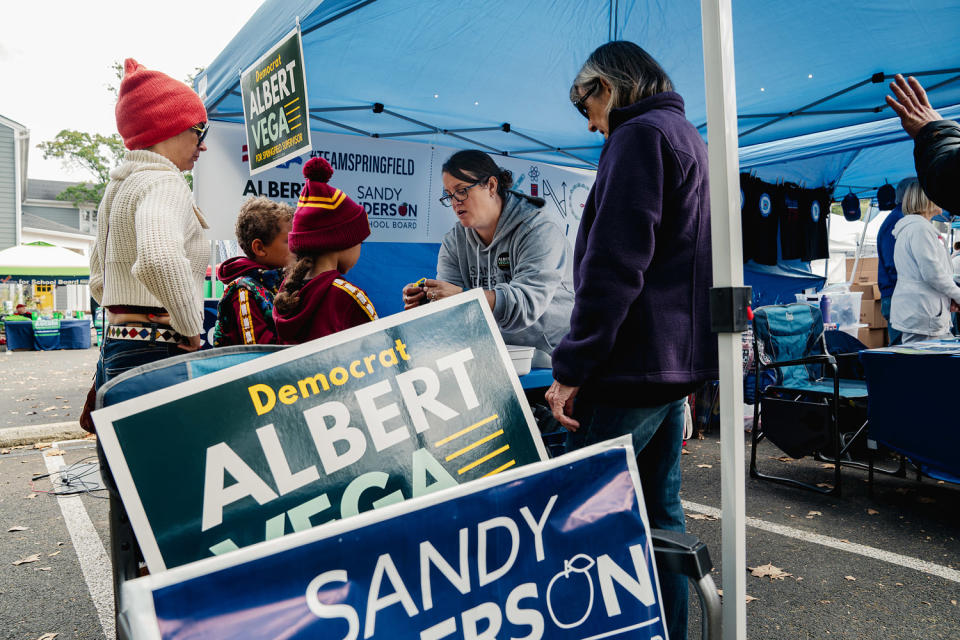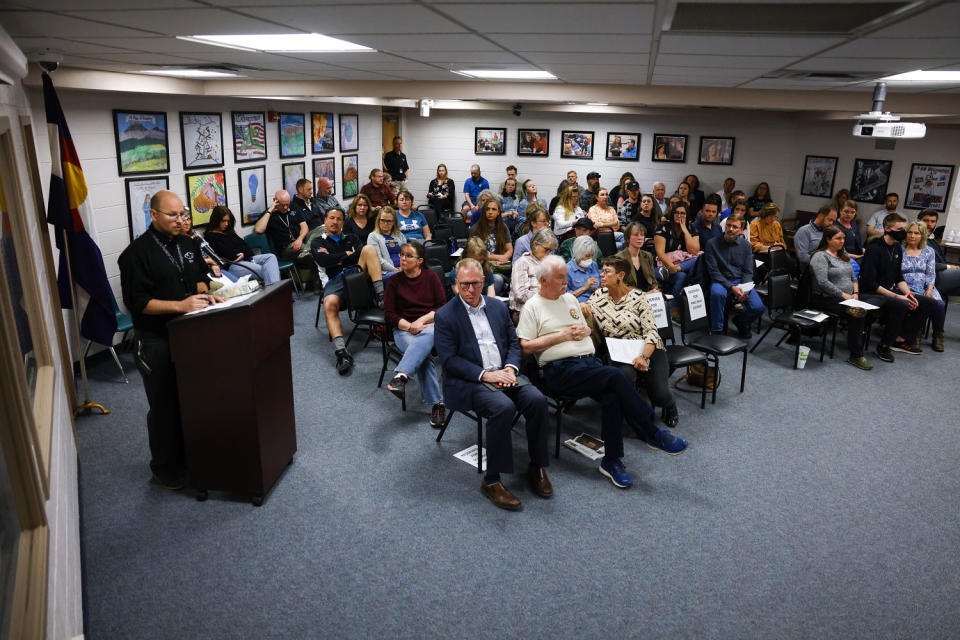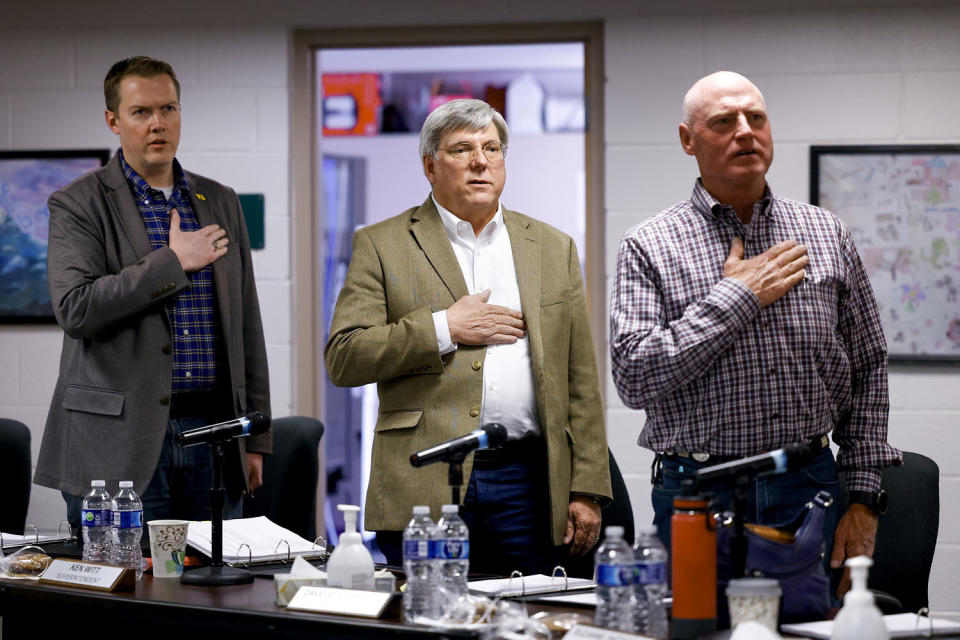Conservative school board candidates lose ground as moderates push back on culture war issues
Liberal and moderate school board candidates claimed victory across the country this week, wresting majority control from Republicans in some swing suburban districts, fending off challenges in liberal communities, and defeating some conservatives who had sparked intense backlash in right-leaning counties.
While school board elections are officially nonpartisan in most of the 16 states that held them on Tuesday, the rancor over culture war issues such as book bans and policies dealing with gender and race polarized many of the contests. And in many of the districts where these issues have dominated board meetings and local politics, conservative candidates were unable to successfully leverage them.
In the suburbs of Des Moines, Iowa, candidates backed by or affiliated with the conservative activist group Moms for Liberty and far-right religious groups lost in several races to candidates endorsed by progressives and Democrats.
In school districts around Overland Park, Kansas, outside of Kansas City, a bipartisan group of self-described “pro-public education” incumbents who supported diversity measures defeated conservative challengers.
In the Philadelphia suburbs, Democrats swept the school board races in the Central Bucks and Pennridge districts, taking the majorities away from Republicans who had pushed for more conservative curricula and banned LGBTQ pride symbols.

The Democratic-controlled school boards in Virginia’s Loudoun and Fairfax counties, outside of Washington, D.C., had been the focal point of heated education controversies for the past two years and were featured frequently on Fox News. Both will stay in the hands of liberals; Democrats held on to a majority in Loudoun and swept all 12 seats in Fairfax, according to unofficial vote totals.
“These results show people are fed up with the political attacks targeting our world-class public schools and teachers,” Karl Frisch, vice chair of the Fairfax County school board, said in a statement.
But liberal and moderate candidates didn’t succeed everywhere.
Candidates backed by Moms for Liberty chapters won school board races in Alaska, Ohio and New Jersey. The group also pointed to York County, Pennsylvania, where a slate of candidates running against the “woke virus” ousted four incumbents.
“Would I have liked to win every race? Absolutely, I would have liked it,” Tiffany Justice, Moms for Liberty’s co-founder, told Steve Bannon on his streaming show Wednesday. “But am I happy that 50 seats were won? Absolutely I am,” she continued, adding that the group is already preparing for 2024 and building its political action committee.
Over the past three years, Republican groups have poured energy and resources into culture war disputes and propelled conservatives onto school boards, where they imposed restrictions on LGBTQ accommodations, terminated administrators and pulled books from shelves. While comprehensive national data on Tuesday’s school board elections was not immediately available, the results largely reinforced recent polling suggesting lagging voter enthusiasm for these fights — in a variety of communities.
Julie Marsh, an education policy professor at the University of Southern California who has studied public school disputes, said conservative losses in swing districts and red states such as Iowa and Kansas particularly reinforced this trend.
“I think parents are tired of talking about bathrooms, books bans and flags and pronouns,” she said.
Tyler Sandberg, a Republican consultant in Colorado, said private polling he’s conducted shows most people do not want either left- or right-wing politics in their schools, and the races this week reflect that.
“With both liberal and conservative district voters, they’re saying, ‘Cut the crap and get back to reading,’” Sandberg said. “They don’t want any fighting on culture war issues. They want good test scores. They want their kids to feel safe.”

Two reliably GOP districts in Colorado that elected far-right school board candidates in 2021 saw at least partial reversals this year.
Douglas County, south of Denver, hasn’t voted for a Democratic presidential candidate since Lyndon Johnson. Two years ago, after a handful of donors pumped in hundreds of thousands of dollars to help conservatives take control of the school board, the new members quickly forced out the district’s superintendent and scaled back diversity and equity efforts, prompting vehement objections from many community members.
According to unofficial results in Douglas County on Thursday, a moderate slate of three school board candidates will defeat their right-wing opponents, though the seven-member board will remain in conservative control.
In the mountain town of Woodland Park, Colorado — in Teller County, which supported Donald Trump over Joe Biden by 35 points — a massive door-knocking effort appears to have achieved at least one victory for the moderate slate fighting for three hotly contested seats on the five-member school board.
With all of the ballots counted by Wednesday afternoon, Keegan Barkley, one of the moderates, held a 2-point lead over David Illingworth, one of the far-right incumbents. Illingworth helped lead the district’s conservative push over the past two years, including for a new social studies curriculum, a gag order on staff and cuts to mental health programs. The two other school board races are separated by less than 60 votes, which could trigger automatic recounts.

Elizabeth Douglas said her family canvassed for the moderate slate because seven of her 11th grade daughter’s eight teachers from last school year left the district.
In all, about 40% of high school staff quit before this school year, while a handful of other district employees said they were fired in retaliation for raising concerns. Last month, 81 teachers and staff members signed a letter saying the superintendent and school board were taking the schools in a direction that’s “unsustainable and detrimental” to students and the community.
Douglas said her daughter “doesn’t need any kind of civics class at this point because she’s gotten it firsthand.”
The district’s superintendent has characterized criticisms as resistance to change from a small group of teachers who seek “a return to sexual politics, anti-capitalism, and hatred for America.”
Turnout in Teller County surpassed 58% on Tuesday, compared to 38% statewide, and the total votes cast for the county’s school board candidates increased by more than a third compared to 2021.
Marsh, co-director of the Rossier Center on Education Policy, Equity and Governance at USC, said she hopes that with more voter participation it will be harder for a small, vocal group to control school districts, though she expects political rancor over public schools to continue.
“I don’t think it’s over,” Marsh said, “but I do think that moderate and liberal groups seem to be a little bit more engaged and savvy and not caught off guard, perhaps as they were early on a couple of years ago.”
This article was originally published on NBCNews.com

